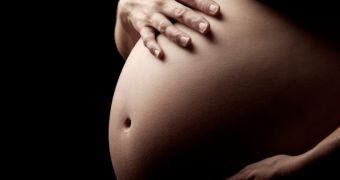Writing in a recent issue of the journal Environmental Health Perspectives, a team of scientists argues that the more weight women gain while expecting, the higher their chances to deliver a healthy baby are.
This is because, according to evidence at hand, the weight that future mothers put on while pregnant helps protect their unborn child from various potentially harmful chemical compounds.
To test the theory that weight gain during pregnancy keeps exposure to several chemicals in check, researchers took the time to monitor as many as 325 expectant mothers from Avilés, Spain.
What they focused on was the weight that these mothers gained while expecting, and the concentrations of 35 different chemical compounds in their babies' umbilical cord blood, Environmental Health News informs.
The chemical compounds that the study took into consideration included brominated flame retardants, organochlorine pesticides, and polychlorinated biphenyls, the same source tells us.
It was thus discovered that, the more weight the mothers-to-be who the specialists monitored put on, the less exposure to all of the 35 different chemical compounds their babies suffered.
The link between weight gain and low exposure to potentially dangerous chemicals was especially strong in the case of a byproduct of the insecticide lindane called beta-HCH and a DDT metabolite.
“Neonatal concentrations of POPs [persistent organic pollutants] were inversely associated with GWG [gestational weight gain] after adjustment for age, pre-pregnancy BMI [body mass index], educational level, and fish consumption.”
“On average, neonates of women with IOM [Institute of Medicine] recommended GWG have lower POP concentrations than neonates of mothers with inadequate GWG,” the researchers write in the paper in the journal Environmental Health Perspectives.
“The present findings suggest an association between neonatal exposure to POPs and inadequate GWG during pregnancy. Encouraging pregnant women to meet the recommended IOM guidelines for GWG may reduce the accumulation of POPs in newborns,” they add.
It is believed that, if they do not gain enough weight while expecting, women start losing fat as their child develops inside their womb. Should this happen, fat-soluble chemicals are bound to be released into the bloodstream and eventually reach the developing baby.
“This study suggests that sufficient weight gain during pregnancy may help to dilute certain chemicals that store in fat, reducing exposure to the fetus,” explains Jonathan Chevrier, an epidemiologist at McGill University in Montreal.
According to specialists working with the Institute of Medicine in the United States, women should gain somewhere between 25 and 35 pounds (approximately 11.3 to 15.8 kilograms) while expecting.

 14 DAY TRIAL //
14 DAY TRIAL //